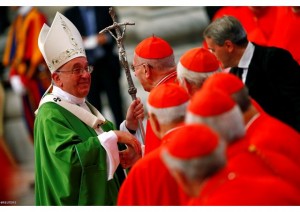Knitting the fabric together you will want to read the Pope’s reflections from the Saturday Vigil, today’s homily and the Angelus address. Read independently you’ll not have the full flavor of what he’s trying to say to the Church.
The difficulty that is arising is the confusion of what a synod is, and the perceived division among the theologians, especially among some cardinals. The pastoral thing to do in any situation is to know in a concrete way what is going on in the people’s way of life. The trouble is bishops and other pastors tend to not to really care what their people believe, think, how they live and what their struggles are: they are too insulated; they are too attached to their own opinions of “what should be.” When you are cut off from the laity: rarely speaking with and listening to them, hearing their confessions, counseling them, etc. there is no way a pastor of souls can claim to know his sheep. See if this is what the Pope is saying.
The homily from Mass follows:
Today the prophet Isaiah and the Gospel employ the image of the Lord’s vineyard. The Lord’s vineyard is his “dream”, the plan which he nurtures with all his love, like a farmer who cares for his vineyard. Vines are plants which need much care!
God’s “dream” is his people. He planted it and nurtured it with patient and faithful love, so that it can become a holy people, a people which brings forth abundant fruits of justice.
But in both the ancient prophecy and in Jesus’ parable, God’s dream is thwarted. Isaiah says that the vine which he so loved and nurtured has yielded “wild grapes” (5:2,4); God “expected justice but saw bloodshed, righteousness, but only a cry of distress” (v. 7). In the Gospel, it is the farmers themselves who ruin the Lord’s plan: they fail to do their job but think only of their own interests.
In Jesus’ parable, he is addressing the chief priests and the elders of the people, in other words the “experts”, the managers. To them in a particular way God entrusted his “dream”, his people, for them to nurture, tend and protect from the animals of the field. This is the job of leaders: to nurture the vineyard with freedom, creativity and hard work.
But Jesus tells us that those farmers took over the vineyard. Out of greed and pride they want to do with it as they will, and so they prevent God from realizing his dream for the people he has chosen.
The temptation to greed is ever present. We encounter it also in the great prophecy of Ezekiel on the shepherds (cf. ch. 34), which Saint Augustine commented upon in one his celebrated sermons which we have just reread in the Liturgy of the Hours. Greed for money and power. And to satisfy this greed, evil pastors lay intolerable burdens on the shoulders of others, which they themselves do not lift a finger to move (cf. Mt 23:4)
We too, in the Synod of Bishops, are called to work for the Lord’s vineyard. Synod Assemblies are not meant to discuss beautiful and clever ideas, or to see who is more intelligent… They are meant to better nuture and tend the Lord’s vineyard, to help realize his dream, his loving plan for his people. In this case the Lord is asking us to care for the family, which has been from the beginning an integral part of his loving plan for humanity.
We are all sinners and can also be tempted to “take over” the vineyard, because of that greed which is always present in us human beings. God’s dream always clashes with the hypocrisy of some of his servants. We can “thwart” God’s dream if we fail to let ourselves be guided by the Holy Spirit. The Spirit gives us that wisdom which surpasses knowledge, and enables us to work generously with authentic freedom and humble creativity.
My Synod brothers, to do a good job of nurturing and tending the vineyard, our hearts and our minds must be kept in Jesus Christ by “the peace of God which passes all understanding” (Phil 4:7). In this way our thoughts and plans will correspond to God’s dream: to form a holy people who are his own and produce the fruits of the kingdom of God (cf. Mt 21:43).
